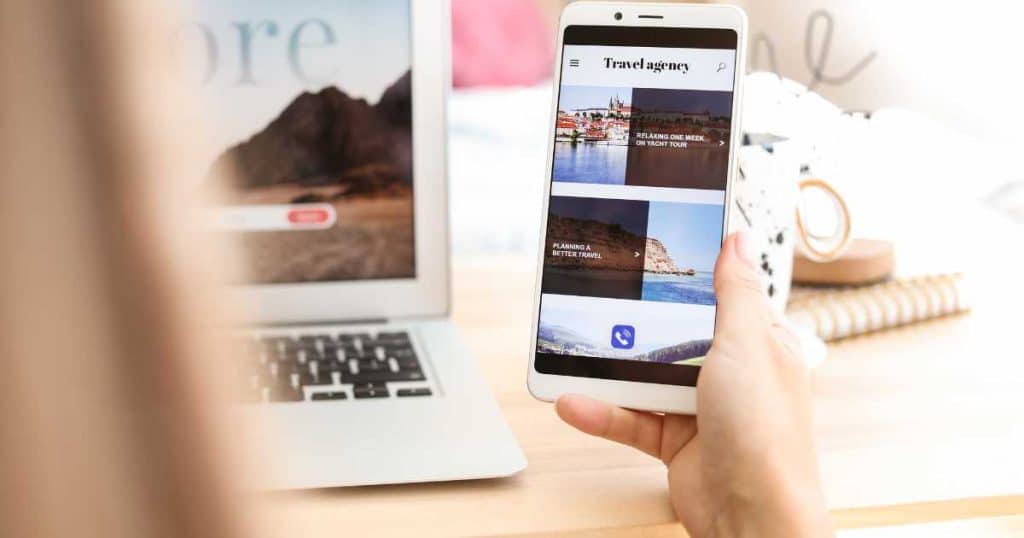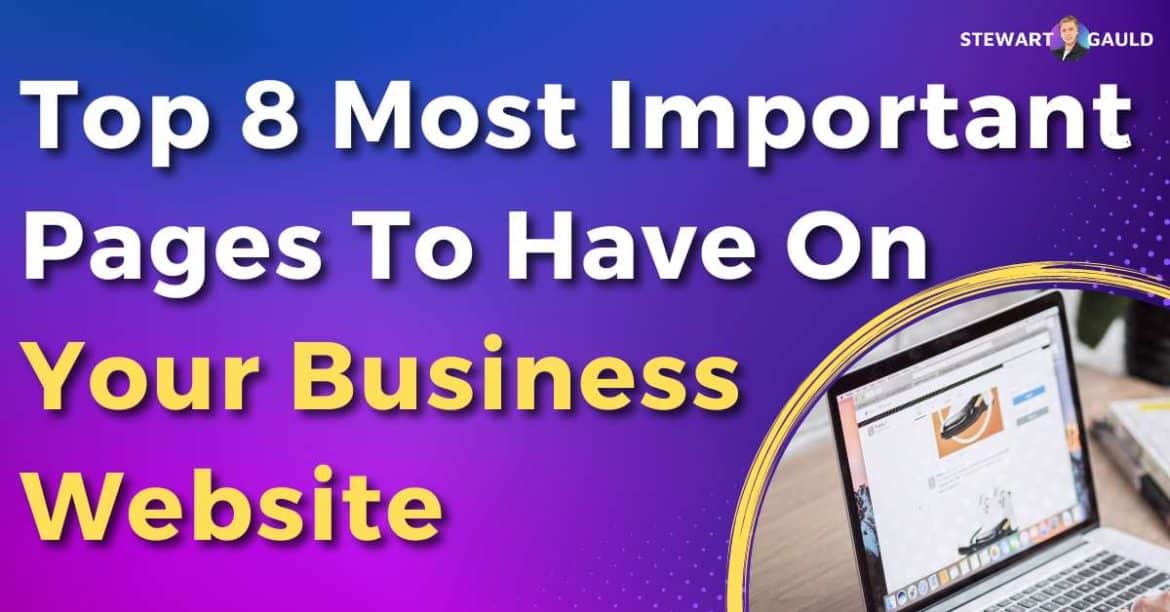In this article, I dive into the 8 most important pages you should have on your business website and why they’re integral to your business success.
Are you creating a brand-new website? Or maybe you’re looking to give your old one a makeover?
Whatever the reason, many business owners ask themselves the same thing. What are the essential web pages that will make my website truly stand out?
And trust me, it’s a question worth asking!
In 2024, it’s simply not enough to whip up a basic website and call it a day—that won’t cut it!
So, what are the top 8 most important pages that can add value to your readers, credibility to your brand, and boost SEO rankings?
Top 8 Most Important Pages On Your Business Website

Different businesses will have distinctive website pages related to their business type. But certain pages are absolutely essential for success!
These pages provide crucial information to your visitors and play a vital role in building trust and establishing your brand.
Here are the top 8 most important pages on your business website:
1. Home Page
The most important page you should have on your website is a home page!
Your home page is the front door to your online presence, and visitors will likely land there first. Therefore, it should leave a lasting impression!
It should be captivating, well thought out, and clearly communicate what your business is all about.
What many people don’t know is that there are two types of home pages – dynamic and static:
- Dynamic home pages are commonly used by blogs to showcase the latest posts (this is the default for WordPress sites).
- Static home pages provide an overview of the website and link to other pages. Although generally used for business websites, you can use them for personal blogs.
A dynamic home page is ideal for quickly displaying blog posts chronologically, ensuring visitors see the most recent content first.
When designing a home page, it’s essential to consider the user experience. In other words, try to encourage your visitors to explore other sections of your website easily.
2. About Us Page
The about page is another super important part of any website, regardless of your business type or size.
This page usually appears right after the home page in the menu section and is where you can showcase all the important details about your website.
You can share your company’s story, mission, values, and the vision behind your brand, which helps visitors connect with your business on a deeper level.
Basically, tell your website visitors what makes your website special, and think—why should people be interested in your business and brand?
When designing your about page, make sure to include all these important details in a way that really highlights your website. So, show off your skills!
This is your chance to captivate your visitors and turn them into loyal customers.
3. Products and Services Page

A products or services page is next on my list of important web pages!
These pages essentially give you a chance to show off all the amazing things you offer in detail.
Think of it this way: while the homepage gives a brief overview, the product or service page goes into the nitty-gritty of your offerings.
Let’s say you have an awesome educational website. This is your chance to go all out and describe your services in a way that convinces the web visitor to choose you!
When designing a service page, remember to make it so compelling that people can’t resist picking you over your competition.
In other words, this is your chance to shine and show people why you’re the best choice!
And if you’re running a business or an eCommerce site and selling products, you definitely need a product page to showcase each and every product you sell.
I suggest going into as much detail as you can! Describe specifications, pricing, and anything else that makes your products stand out from the crowd.
And here’s a thought – you could even jazz things up and turn your product page into a gallery by categorizing your products and then displaying them like a beautiful collection!
Read more: Why Do Most Small Businesses Fail?
4. Testimonials and Reviews Page
Sure, you could display testimonials on your home page, but having a dedicated testimonial page can give you a clearer picture of what your clients think about you.
It’s like giving your social credibility a significant boost, and including them on your website is super important!
Think of your testimonial page as a window into the experiences of what people that you’ve already worked with think of you.
Whether they’re gushing about your products, services, or website’s user experience, these testimonials prove that you’re the real deal (and do exist!)
I advise going the extra mile by adding details about the person leaving the feedback, like their name, a mini bio, photo, or workplace (but make sure you ask them if you do this).
This will make your testimonial page shine!
Remember, social proof is crucial in gaining trust. Showcasing positive testimonials and reviews from real and satisfied customers can go a long way in building credibility.
Read more: How Much Does a Small Business Website Cost?
5. Contact Us Page

Let’s discuss another highly crucial page on your website – the contact page.
This is the page where potential clients or visitors can easily reach you after discovering your website.
Being a direct line of communication between you and your audience, you should ensure this page is accurate and clear!
Include all the necessary details like your address, phone number, email, business hours, social media handles, etc.
Basically, include any relevant contact info so that people can easily get in touch with you.
I’d also consider adding a contact form to your contact page, which you can link to your email address, streamlining the communication process!
Read more: How to Add a Contact Form To Your Google Sites Website.
6. Blog Page
This page lets you share valuable content, engage visitors, demonstrate your expertise, and drive organic traffic to your website.
But you might be wondering, do you actually need a blog page??
While a blog page is crucial or many websites, it’s not actually necessary for all businesses.
For example, if you designed your website so that your latest blog posts are directly on the home page, then you probably don’t need a separate blog page.
On the flip side, if your home page highlights other content within your site, a dedicated blog page is essential for displaying posts in an organized and chronological way.
Think of your blog page as a central location for all your posts, avoiding the need to create separate pages for different types of posts!
Read more: My Top 10 No-code Tools For Small Business.
7. Privacy Policy and Terms of Service Page

While many websites naturally combine these pages, others (especially larger companies and organizations) choose to keep them separate.
However, the decision to merge or separate these pages ultimately depends on your business and the purpose of your website.
The privacy policy page explains how users’ information will be used, while the terms and conditions page outlines the rules and regulations governing the website’s use.
These legal pages are essential for protecting both your business and customers.
And in certain countries, did you know that having a privacy policy and terms and conditions page is vital for legal compliance?
Read more: How Much Is SEO For a Small Business?
8. Frequently Asked Questions Page
Last on my list of the top 8 most important pages on your business website is the FAQ (frequently asked questions) page!
The convenience and usefulness of the now common FAQ page has become one of the most vital sections on any website.
Rather than waiting for users to ask you questions directly, you can proactively compile a list of popular questions and then provide thorough answers on the FAQ page.
By doing so, users can easily find the information they seek without contacting you personally, saving time for everyone involved!
Can You Have a One Page Website?

Believe it or not, you can create a compelling website with just one page!
Single-page website designs serve different purposes, but whether they suit your needs is a different story.
When executed well, a single-page website can provide a focused and streamlined user experience, leading to faster loading times and increased user engagement.
However, due to their limited functionality, I would only suggest single-page websites for information-based websites, cafes, event-related companies, or portfolios.
While single-page websites can attract traffic, they’re not the best fit for SEO and specific keyword targeting purposes.
Furthermore, one-page websites aren’t the most suitable option for presenting detailed information like product or service descriptions, about sections, and contact information.
Read more about my favorite free one-page website builder, Google Sites, here.
How Many Pages Should a Website Have For SEO?

The number of pages you should have for SEO depends on your business type and objectives.
As a general guideline, I recommend 10-30 pages for most small businesses looking to showcase their products and services effectively.
While having a larger volume of pages to enhance your SEO may seem beneficial, quality is always more important than quantity!
Search engines like Google are highly intelligent and value websites that provide unique, high-quality content that is consistently updated.
Read more: Is It Possible To Do Your Own SEO?
Stews Final Thoughts
Okay, that wraps up this guide exploring the 8 most important pages on your business website!
If these pages are well-designed, informative, and easy to navigate, you can build a powerful online presence that engages your audience, builds credibility, and drives business growth.
While the web pages mentioned above are important, it’s essential to note that there may be other pages you need to display on your website.
The key? Consistently tailor your website to support your goals while providing a seamless user experience.
So, how many of the above pages do you have on your website? Let me know below!

